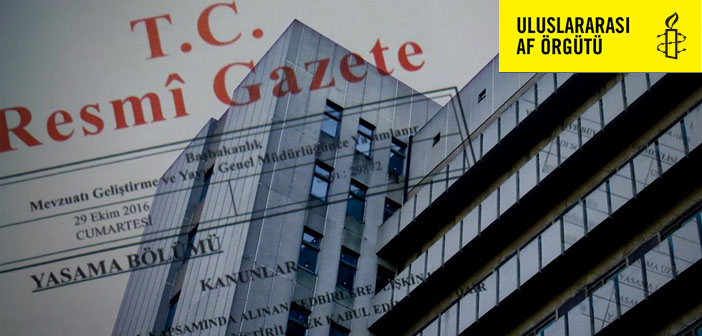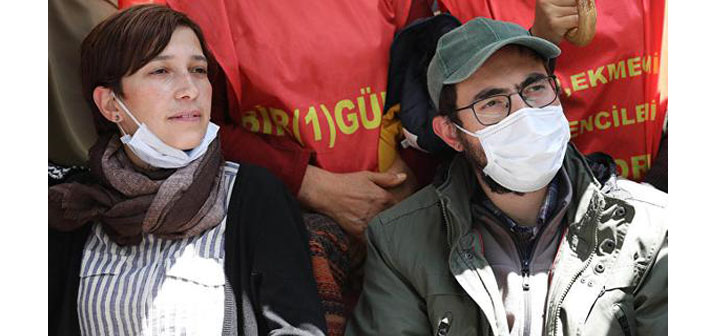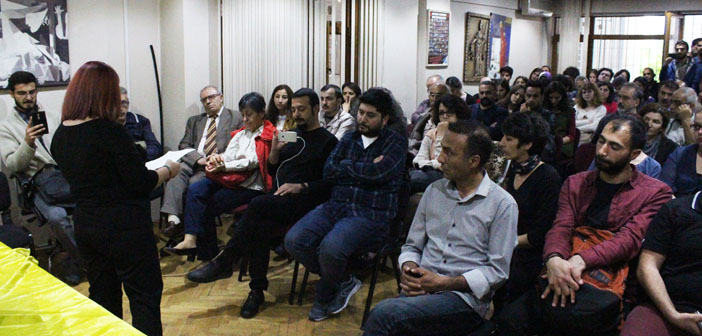Amnesty International, in a report concerning dismissed public sector workers, stated: "The blanket nature of the dismissals, the fact that the dismissed include trade union, political or human rights activists and known critics of the government from conservative sections of society, and the broader crackdown on dissent that has included the jailing of more than 120 journalists awaiting trial since the 2016 coup attempt, increase concerns that a great many dismissals were arbitrary, unfair and/or politically motivated."
Today, Amnesty International released a report titled "No end in Sight: Purged public sector employees denied a future".
The report is based on 61 interviews, including 33 with dismissed individuals, and meetings with the Turkish authorities, representatives of trade unions, NGOs and lawyers. Amnesty International also met with representatives of the Ministry of Justice and the Ministry of Health and included their views in the report. Meetings with the Ministry of Interior and the Ministry of Education were also requested, but there was no reply to this request.
The report states that
dismissals and related practices violate rights to freedom of
expression, association, or assembly that are protected by
conventions to which Turkey is a party.
The report deals with titles such as official justifications for dismissals, impact on families and whether there is any effective way of appeal.
More than 100,000 workers have been dismissed
The state of emergency, which was declared on July 21 following the coup attempt, and ensuing emergency decrees led to dismissals of more then 100,000 people. “More than 100,000 public servants have been dismissed from their jobs and banned from public service on the generalized grounds found in the decrees, that those dismissed are 'members of, connected to, or in communication with a terrorist organization', without any individualized justification or evidence being provided.”
According to the report, here is the number of dismissed workers:
More than 33,000 are teachers and other employees of the Ministry of Education,
More than 24,000 are police officers and other employees of the Ministry of Interior,
More than 8,000 are members of the armed forces,
More than 6,000 are doctors and other employees of the Ministry of Health,
More than 5,000 are academics and other higher education employees,
More than 4,000 are judges, prosecutors and other employees of the Ministry of Justice,
More than 3,000 are employees of the office of the Prime Minister and connected institutions.
More people suddenly lost their jobs through the closure of the institutions employing them, including universities, hospitals, schools, by emergency decree.
“For their real or perceived opposition”
The report includes the following assessments:
“The main target of the purge is people perceived to be followers of Fethullah Gülen, the head of the Gülen movement, whom the government holds responsible for the coup attempt, referring to them as the “Fetullahist Terrorist Organization” (FETÖ). However, it is clear that a much wider group of people have been targeted.”
“Dismissed persons who spoke to Amnesty International denied links to terrorism or any other wrongdoing. They allege that they have been targeted for their real or perceived opposition to the ruling Justice and Development Party (AK Party) government or for other illegitimate reasons.”
What is justification of dismissals?
Discussing the virtual and official justifications of the dismissals, the report provides the following information concerning legal prodecures:
"Assessing why individual dismissals took place is currently impossible, as none of those affected have been provided with any evidence of their alleged personal wrongdoing."
"The decrees simply offered the generalized justification that all the individuals listed in them were '…part of, connected to or in communication with a terrorist organization.'"
"Relevant public administrations have not presented any individualized justification for the dismissals nor have the dismissed individuals been able to obtain any, in the many months since their dismissal."
"The blanket nature
of the dismissals, the fact that the dismissed include trade union,
political or human rights activists and known critics of the
government from conservative sections of society, and the broader
crackdown on dissent that has included the jailing of more than 120
journalists awaiting trial since the 2016 coup attempt, increase
concerns that a great many dismissals were arbitrary, unfair and/or
politically motivated."
What are the dismissed people going through?
According to the report, here is the impact on dismissed people:
"Public sector employees have not just lost their current jobs; they have been expelled from public service, and given the wide definition of public service, this means that many have been prevented from continuing their chosen professions."
"Due to the stigma of being branded 'terrorists' under the decrees, many have not been able to find any work at all."
"Others, along with their families, have lost housing and health care benefits connected to their jobs."
"Unable to earn a living in Turkey, dismissed public sector employees have been prevented from seeking employment abroad, as the decrees also require the cancelation of their passports."
"The ad hoc commission lacks either the independence or the capacity to make the mechanism effective"
"The highly uncertain future for dismissed public sector employees is heightened by the absence of any effective means for them to challenge their dismissal."
"Currently, no courts in Turkey have accepted jurisdiction to review the dismissals."
"An ad hoc commission is to begin assessing the dismissals and the closure of institutions under the state of emergency but its seven officials will lack either the independence or the capacity to make the mechanism effective."
"In order to process the caseload, the members will have to take hundreds of decisions per day during their proposed two-year mandate."
"The European Court of Human Rights has thus far rejected cases brought by dismissed individuals on the grounds that they have not exhausted domestic remedies against their dismissal."
Demands from the government
Amnesty International urged Turkish government "to end the arbitrary dismissal of public sector employees in order to comply with the human rights standards that they profess to uphold."
The report includes the following demands:
Ensure that public sector employees subjected to disciplinary proceedings are afforded the right to trade union representation and have an effective opportunity to present their defence before any sanctions are imposed.
Ensure that public sector workers found not to be guilty of wrongdoing are able to return to their previous jobs and/or are provided with appropriate compensation.





